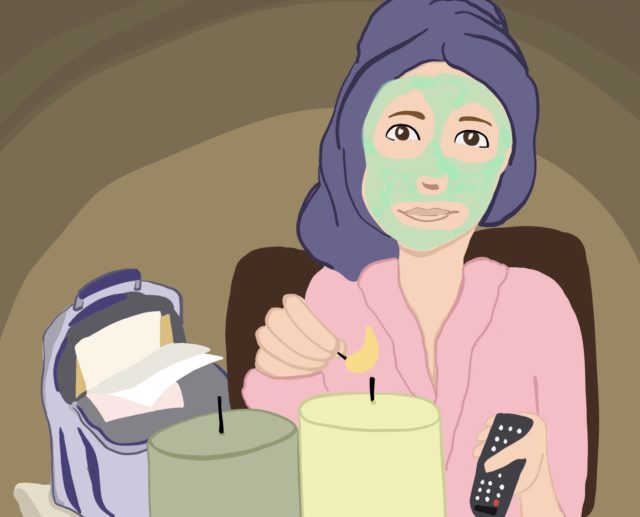By The Editorial Board
The strain of daily life on a college student, or anyone for that matter, can often be underestimated. As a society, we’ve normalized overworking ourselves and prioritizing almost everything over care for our bodies and minds.
Practicing self-care is essential in order to function at our best. The National Institute of Mental Health defines self-care as “taking the time to do things that help you live well and improve both your physical health and mental health.”
In 2021, a study about overworking in relation to ischemic heart disease and strokes was published by the World Health Organization in the Environmental International. The global study found that in 2016, 488 million people were exposed to long working hours — over 55 hours per week — and it found about 745,194 “attributable deaths.”
While most college students are not working over 55 hours per week, these global statistics shed light on the very harmful norm of prioritizing other commitments like work over self-care. Trying your best and working hard does not exclude investing in personal health. In order to do your best work, you must also feel your best.
The pressure of balancing priorities is overwhelming. With multiple classes a day, hours of homework and perhaps even a job, club or other commitment, it can be hard to stay afloat — especially while trying to do well in all of those things.
Needless to say, stress levels are high. About 88% of college students say their school lives are stressful, and 45% report high levels of stress, according to American Addiction Centers.
High levels of stress impact a variety of things. Anxiety and stress can lead to poor performance in school, mental health decline and even physical illness. With a busy schedule, it’s easy to get caught up in the day-to-day stressors and forget about prioritizing your own well-being.
According to Mental Health First Aid, “Americans cited benefits of self-care as: enhanced self-confidence (64%), increased productivity (67%), happiness (71%). From a physical health perspective, self-care also reduces heart disease, stroke and cancer.”
Think about the things you do daily to stay physically healthy and what you do when you’re sick. We rest when we don’t feel well, take Advil when our head hurts and take cough syrup when we have a cold.
We know the warning signs of physical illness, and we take action to feel better. The process for managing mental health and practicing self-care is the same. Take the time to note your personal signs of stress, and do things that help.
Practicing self-care daily is essential to mental health upkeep. Utilize your resources on campus. For your own sanity, treat yourself and find a gateway for stress relief. This can be a physical activity or just having some “me time.”
Treating yourself can be setting aside your homework and spending time with friends, getting ice cream from Andy’s, going for a walk or watching your favorite show.
No matter how well or poorly things may be going with school or a job, it’s OK to put some responsibilities aside to treat yourself. The work will be there tomorrow. Your health and happiness are more important than any assignment could be.



